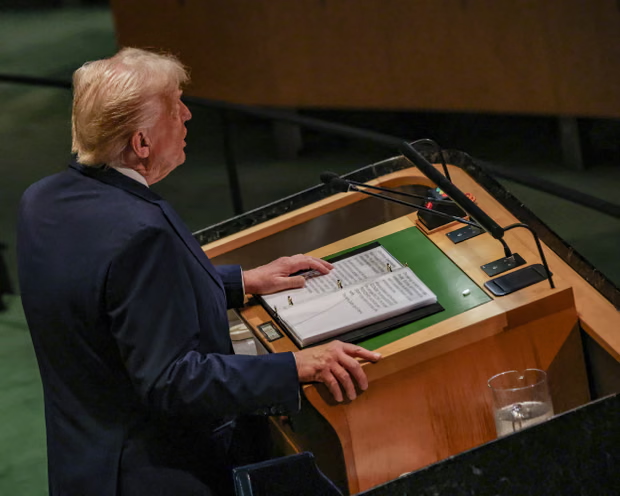Donald Trump has alleged that he was the victim of “triple sabotage” during his appearance at the United Nations General Assembly in New York. The former U.S. president said an escalator stoppage, a failed teleprompter, and sound problems were part of a deliberate effort to disrupt his visit.
In a lengthy post on his social media platform, Trump described the incidents as “a real disgrace” and insisted they were no coincidence. He argued that the sequence of failures amounted to “triple sabotage at the UN” and demanded an immediate investigation.
The controversy, already dubbed “Escalatorgate,” began with Trump’s dramatic entrance to the assembly hall. As he and former First Lady Melania Trump stepped onto the moving stairway, it came to a sudden halt. Trump said the pair nearly fell forward onto the sharp steel steps. Melania Trump then climbed the escalator stairs on foot, followed closely by her husband.
UN officials, however, offered a different explanation. According to Stéphane Dujarric, the UN’s chief spokesman, a videographer traveling backward on the escalator to capture Trump’s arrival may have accidentally triggered a safety function designed to prevent accidents. Dujarric explained that a UN technician reset the system once the delegation had reached the second floor.
Despite this account, Trump rejected the official explanation. In his post, he accused unnamed individuals of deliberately trying to embarrass him on the world stage. He called for security tapes of the escalator to be preserved and said the Secret Service was already involved in reviewing the incident.
The second mishap involved the teleprompter, which Trump said went “stone cold dark” as he began his remarks. Forced to improvise, Trump later told his wife that he had managed without it, only to be told she could not hear his words clearly. Trump cited this as the third act of sabotage, claiming the sound system had failed during his address.
Video recordings, however, showed the audience reacting immediately to his remarks. Delegates laughed when he joked about the faulty teleprompter and listened attentively as he criticized global migration policies. These reactions suggest the sound problem may not have been as severe as Trump alleged.
During his speech, Trump used the malfunctions as part of his delivery, telling delegates that “a bad escalator and a bad teleprompter” were all he received from the United Nations. He then pivoted to a combative address in which he questioned the purpose of the global body and warned European nations that unchecked migration would send their countries “to hell.”
White House press secretary Karoline Leavitt later echoed Trump’s concerns. Speaking on Fox News, she suggested the escalator stoppage might have been part of a deliberate plan to humiliate the president. She warned that if UN staff members were involved, there must be accountability.
Adding fuel to the controversy, Trump pointed to a recent newspaper report claiming that UN staff had joked about shutting down escalators as a prank on him. He argued this report proved his suspicion of a wider conspiracy. “The people that did it should be arrested,” he declared in his online post.
While the UN insists the issues were minor and accidental, the incident has become another flashpoint in Trump’s ongoing clashes with international institutions. His demand for accountability reflects a broader narrative he has long promoted, portraying global organizations as hostile to his leadership.
For supporters, Trump’s complaints reinforce his image as a leader under siege by unfriendly institutions. For critics, the evidence suggests technical errors rather than sabotage. Regardless, “Escalatorgate” has quickly become a political talking point, merging technical glitches with Trump’s larger battle against the UN.
As debate continues, the incident shows how even small malfunctions can escalate into headline controversies when involving a figure like Trump. His UN sabotage claims highlight both the fragility of high-profile events and the deep mistrust that defines his relationship with international bodies.







